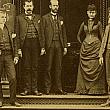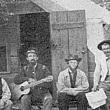Romance of the War
by Detroit Tribune, Nov. 18, 1864
On Thursday we learned of a very remarkable incident in connection with the first regiment of Michigan Engineers and Mechanics, which goes far to illustrate the old proverb that "when a woman will she will, depend on't," etc. In the Fall of 1861, a young man, whose name it is not necessary to mention, conceived the idea of joining the above named regiment. He had previously formed the acquaintance of a young girl living in the same village, whose proper name is Marian Green, and in fact, became enamored of her.
They were engaged to be married, and she protested against his going into the army. He, however, had made up his mind to go, and go he did. She threatened to follow, but was finally prevailed upon to remain at home, but only consented after a solemn promise that her "brave boy in blue" would ever cherish and regard her as his affianced. The following December Marian Green bid goodbye to her lover at Ypsilanti, having gone there to see him "off for the wars."
Letters passed regularly for months between the parties, but Marian grew tired of being absent from her lover, and finally resolved to join him. This time she kept the matter a profound secret. An opportunity was soon offered, and she set her wits to work to accomplish her long-desired wish. By an arrangement, known only to herself and a certain surgeon, she managed to enlist in a detachment that was subsequently recruited for the regiment, and in the Summer of 1862 she, together with many other new recruits, joined the main organization, then engaged in rebuilding some bridges on the Memphis and Charleston Railroad.
Although Marian had informed her parents that she was going to leave home on a visit to some friends in Illinois, she was soon missed, and anxious inquiries were made concerning her prolonged absence from home. No tidings of her could be learned, and the sorrow-stricken parents remained unaware of her whereabouts until a few days ago, when she arrived home safe and sound, having apparently enjoyed soldier life amazingly. She, owing to her boyish appearance, while with the regiment, managed to avoid the more arduous labors incident to that organization, and by that means was enabled to bear up under the fatigue and exertions of a soldier's life.
As letters written by her lover remained unanswered, save by her parents, he became sad and lonely. Could she have deserted him and eloped with another, after having so frequently reassured him to the contrary. He could not, for a moment, entertain any such idea. That she would eventually prove true to her declarations, he felt no doubt. Strange forebodings, however, crept over his mind, and so worked upon his feelings that, in the fall, he was taken sick, and was sent to the hospital.
Imagine his surprise when, after a day or two, a familiar countenance there met his anxious gaze. It was none other than that of Marian Green! It is unnecessary to repeat all that transpired; suffice it to say that mutual explanations followed, never to reveal the discovery there made. Months followed, and still Marian Green remained in the hospital, kindly nursing the patients. She kept her sex a secret for a time, and would doubtless have done so for the whole term of her enlistment, had not the young man proved recreant to his trust. He wrote a letter to her parents, informing them of the discovery, and they soon found means to bring home their long lost daughter. She was loth to depart for home, but, obedience to her parents, rendered it necessary that she should do their bidding, especially since her sex had been discovered.
A few days since her lover returned home, and Marian Green, learning that a portion of the regiment had been discharged, came to this city where she met the idol of her heart. A Justice of the Peace was visited on Thursday, and the happy pair were made one. To-day they return home to the inland town from whence they came, with their hearts full of joy and their pockets full of greenbacks.
Reprinted in the Nashville Dispatch, January 4, 1865, p. 4, c. 1

 facebook
facebook

